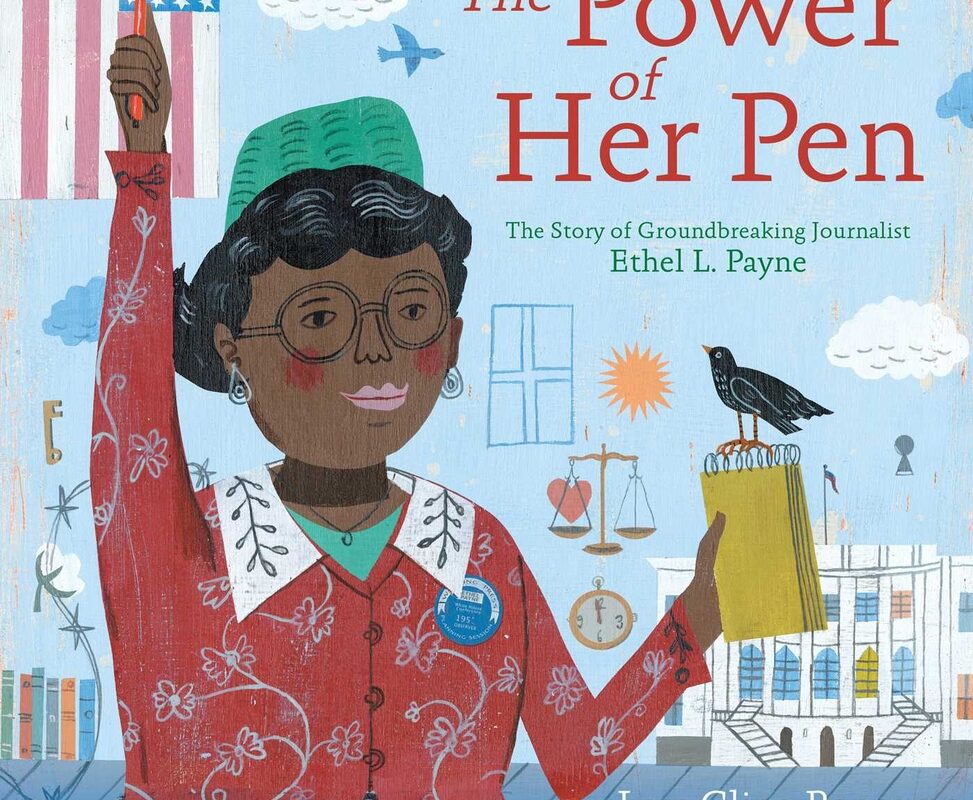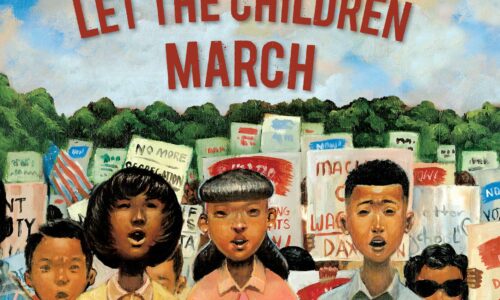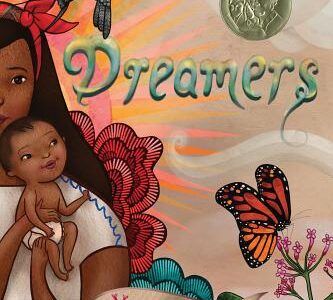The Power of Her Pen: The Story of Groundbreaking Journalist Ethel Payne
by Lesa Cline-Ransome & John Parra
“Ethel Lois Payne always had an ear for stories. Long past her bedtime, Ethel collected the stories of people who followed a path paved with dreams.”
Ethel Payne grew up with a love of stories and writing that led her to become a journalist. She spent her career focused on advocating for change and using her voice to share the experiences of Black people in America. She entered the White House as the only Black female reporter but did not let that prevent her from asking important and difficult questions. She was integral in sharing information during the Civil RightsA group of rights (things promised to you) that protect people's ability to live life within a larger group (usually a country) without being treated unfairly because of things like skin color, gender, physical limitations, or religion. Civil rights include protecting people's physical and emotional safety. More MovementA group of people acting as one because of a shared belief. More. Her work was so well regarded that she earned the title, “First Lady of the Black Press.”
Talk About It
- What do we learn about Ethel’s family history on the very first page? Talk to your child about the fact that Ethel’s grandparents were enslavedThe correct way to talk about slavery. It shows that slavery was something forced upon people. (No one ever chose to be enslaved. In fact, they were never given a choice.) It also reminds us to think about who all of these people were in their lives with family and friends. More. Explain concepts your child may not know about like auction blocks and northbound trains.
- Why do you think Ethel and her family had to go across town to visit the library? How do you think it made Ethel feel to not have equal access to libraries and books? Talk about the fact that while enslavement had ended there were still many forms of disparity and segregationSeparating one group of people from another; often based upon race. Segregation happens when a society views one group of people as better than another. The goal is to keep the "lesser" people away from the "superior" group. This is often done by treating the other group poorly and denying them basic civil rights. More, even in the northern states. It is also important to point out that inequalities still exist today within neighborhoods comprised predominately of people of color. (Parents: Advancing Racial Equity in Public Libraries is a very informative source for learning more about the history of inequality within the library system and initiatives for change.)
- Do you know why Ethel had to walk a mile to go to school? Why do you think people would yell and throw rocks at her? Talk to your child about how many White people did want to see public schools desegregated. What do you think it was like for Ethel to know that simply because of the color of her skin adults (and children) felt they had the right to hate her and physically attack her? Do you think this should ever be okay? What can you do to stand up for someone if you see them being treated similarly to Ethel’s experience?
- What do you think it meant to Ethel to have people in her life that supported and encouraged her writing? How do you think their belief in her helped Ethel stay motivated? What might Ethel have been thinking and feeling when she couldn’t work on the school newspaper but could have her story printed? Does that seem fair?
- Pause to reflect on all of the ways Ethel used her energy and skills to help stand up for what she believed in and speak out for change.
- What do you think about the fact that Black soldiers were treated differently than White soldiers, including facing segregated housing and harder jobs? Do you think that anyone who volunteers to help fight for the freedom and safety of others should be treated worse than the person next to him or her because of skin color? What do they think about the fact that while many Black Americans continue to serve in the military; they are not adequately represented in the top positions. Be honest with your child about the fact that the military also continues to struggle with equality around things like the treatment of women and sexual orientationWho you are attracted to (find cute, have a crush on, etc) or love. More.
- What do you think it was like for Ethel to learn that her article had been published in the United States? Reflect on all she had persevered through to get to this point and the feeling of pride at having her stories read by thousands; especially given that she was telling stories of the Black experience in the military. Also the fact that she was hired by a newspaper; an opportunity she had been denied in high school.
- Take a minute and imagine being Ethel at the White House; one of only a few Black reporters (and the only female Black reporter). What do you think gave her the strength to ask her questions, using her voice to advocate for the rights of Black Americans? Notice aloud how through the decades Ethel never shied away from asking presidents important questions about equality and the need for the President of the United States to take the lead in advancing the rights, education, and opportunities of Black Americans.
- Do you agree with Ethel that somebody had to speak up and fight for change? Do you think we continue to need people to do that today? What kinds of people have you seen fighting and speaking up for change? Talk about the idea of being an activistSomeone who feels so strongly about an issue (like racial equality or ending bullying) that they are willing to take action to make a change. Activists spend time and energy learning more about a topic and sharing that knowledge with others. Activists speak up when they notice someone or something being treated unfairly. More and why it is so important.
Explore More
- Spend time learning more about Ethel Payne: Ethel L. Payne; Read All About Ethel Payne; and Black Journalist Ethel Payne Changed the National Agenda with Coverage of Civil Rights
- Learn more about historical references in the book. To learn about the Pullman Porters check out Pullman Porters; Pullman Porters – Ordinary Men, Extraordinary History; and A. Phillip Randolph Porter Pullman Museum. Did you know that the Chicago Defender continues to operate as an online publication? To learn about the history of the newspaper check out The Chicago Defender, Legendary Black Newspaper, Prints Last Copy; Remembering the Chicago Defender, Print Edition; and The Exemplary Legacy of the Chicago Defender.
- As a child, Ethel experienced verbal and physical attacks of racismThe belief that a person's personality, behavior, & values is based solely upon their race. It is also the belief that one group of people are better than another. More. Talk together about ways racismThe belief that a person's personality, behavior, & values is based solely upon their race. It is also the belief that one group of people are better than another. More might show up between children today. Make a plan of a few things your child can say or do when they witness racismThe belief that a person's personality, behavior, & values is based solely upon their race. It is also the belief that one group of people are better than another. More or any other form of discriminationWhen someone is treated unfairly or differently because they belong to a particular group. For example race, age, gender, sexual orientation, or gender identity. More. Spend time role playing this list in order to build confidence in your child’s ability to take action when on their own.
- As a family talk about issues in our country and world that are important to you. For each issue think about how you can “be an instrument for change.” These can range from making a donation; attending a protest; sending emails to businesses or legislature; or finding opportunities for on-going volunteering. Create a calendar of action with dates and to do items to help keep your family motivated.
- Draw a picture of yourself as an activistSomeone who feels so strongly about an issue (like racial equality or ending bullying) that they are willing to take action to make a change. Activists spend time and energy learning more about a topic and sharing that knowledge with others. Activists speak up when they notice someone or something being treated unfairly. More. Create a slogan and place it somewhere on the drawing.
- Ethel used her ability to ask questions and tell human stories to fight for what she believed in. Imagine you are a reporter and think of people you would like to interview about issues that matter to you. Make a list of 3-5 names and come up with a few questions you would ask. Try to think like Ethel and ask about things like how these people plan to be activists for change; how they’ve been impacted by the issue you are discussing; or what’s one thing they wish people better understood. Help your child contact the names on their lists and see if they can actually get answers to their questions. Write up those interviews; maybe even create your own newspaper to share with others.




